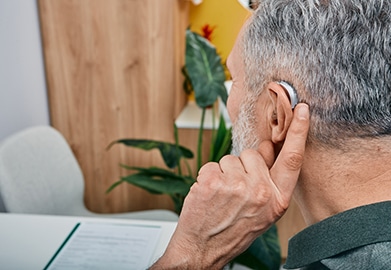Know the Connection Between Diabetes and Hearing Loss


Did you know that hearing loss is twice as common in diabetes patients than in people without diabetes? This can seem surprising given that diabetes affects the blood sugar levels and organs like the kidneys and heart.
Unfortunately, many people, including health professionals, aren’t aware of the risk of hearing problems in diabetes patients. Given that hearing loss is tricky to self-detect, one will realize that they have a problem when it has already deteriorated. To help control this, experts recommend that diabetes patients schedule a hearing test every year and consider hearing aids early enough if necessary.
So, what exactly is the connection between diabetes and hearing loss, and do you need to consider visiting a hearing loss specialist when diagnosed? Continue reading as we explain this.
How Can Diabetes Cause Hearing Loss?
Diabetes causes hearing loss by damaging small blood vessels and nerves in the ears. Like other body parts, ear nerve cells need adequate blood circulation for them to work effectively. When high glucose levels are in the blood, it leads to damage or death of these nerves, thus affecting hearing. On the other hand, if glucose is low in the blood, it affects how nerve signals travel from the inner ear to the brain, which also affects hearing.
Diabetes and Hearing Loss: Both Common and Treatable
Diabetes and hearing loss are common problems, with both affecting a significant number of the world’s population. Although they are usually detected late, especially for people who don’t have regular checkups, they are both treatable and manageable. The late detection of hearing loss caused by diabetes is because some specialists don’t know that there is a link between diabetes and hearing loss. Additionally, diabetes patients with hearing loss will still hear, but hearing deteriorates gradually, so it may take a while before they go to a hearing clinic in Mississauga. Therefore, visiting a hearing centre is the surest way to detect and solve the problem.
Connections Between Diabetes and Hearing Loss
Balance Problems
Your body balance is controlled by the vestibular system, which is part of the inner ear. When high or low blood sugar levels affect the ear blood vessels, this system is also affected. As a result, the affected person is usually at risk of falling and also feeling dizzy.
Diabetes and Tinnitus
Tinnitus is a common problem with people with hearing loss, especially if it is unmanaged or untreated. For this reason, diabetes patients are likely to have ringing ears due to their hearing problems. Moreover, even diabetes patients without hearing loss issues are likely to have tinnitus. This is a result of their medication, as some diabetes drugs have side effects like tinnitus. The link between diabetes and tinnitus is still not clear, and more studies on this are needed.
Diabetes and Ear Infections/Itchiness
Itchy ears are a result of illnesses like liver disease and diabetes. Additionally, diabetes reduces ear wax acidity. The wax acidity helps reduce infections of the outer ear and ear canal. For this reason, diabetes patients are at a higher risk of these infections. The reduced acidity could also damage the ear’s skin.
Diabetes Care is Key
Don’t be scared or fear ending up deaf after being diagnosed with diabetes. With good diabetes care, you can take care of your ears and may never have to consider hearing aids. Keep a close eye on your ABCs to ensure that your blood sugar is well controlled. The ABCs are A1C, Blood pressure, Cholesterol, and Smoking.
- A1C: the goal set for the A1C blood test is less than 7%. This test measures your average blood sugar over 3 months. Your doctor can inform you whether you need a different goal.
- Blood pressure: high blood pressure can cause tinnitus and other heart problems. Measure your blood pressure regularly to see whether it is below 140/90mmHg. You can also check with your doctor to see whether you can use a different goal.
- Cholesterol: bad cholesterol can build up in your body and clog blood vessels. Clogged blood vessels can cause hearing problems. Ask your doctor about your recommendable cholesterol levels.
- Smoking: Smoking affects hearing and can complicate diabetes treatment. Therefore, if you smoke tobacco or its products, take a step towards quitting for better health.
Other Ways to Protect Your Ears
For better hearing protection, you should:
- Schedule an annual hearing test.
- Manage your weight, as the extra weight can make it difficult for the heart to pump blood throughout the body.
- Use earplugs or headphones when in excess of noise to protect your ears from the noise. You can also visit a hearing centre for advice on how to protect your ears if you are constantly in loud noise.
- Exercise regularly as this helps better blood flow and circulation. Ask your doctor about the best exercise for you.
- Use hearing aids when necessary to control and treat hearing problems.
Book a Hearing Test Today
Hearing loss problems are manageable and treatable, especially when detected early enough. Book a hearing test with Bravo Hearing Centre as early as possible for expert hearing solutions. Here, you can also get quality hearing products if necessary. Contact our specialists today and book your appointment or follow-up consultation.


